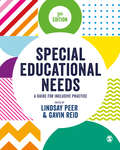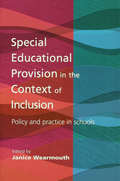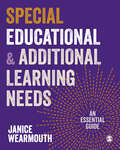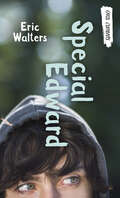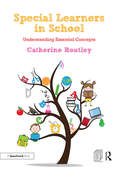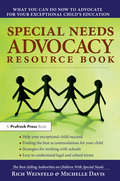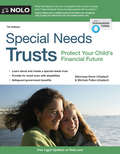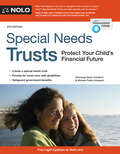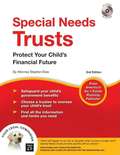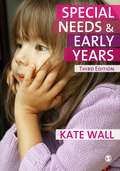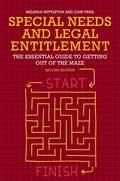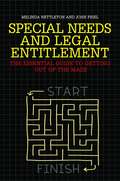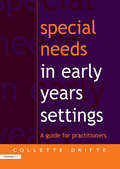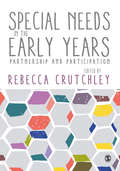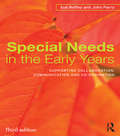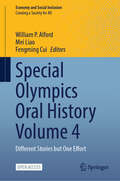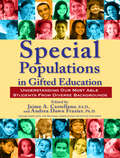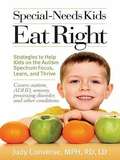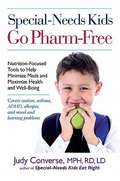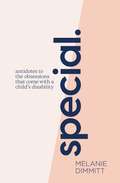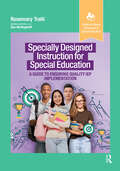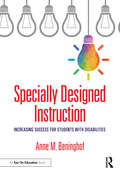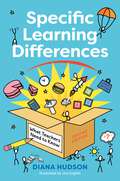- Table View
- List View
Special Educational Needs: A Guide for Inclusive Practice
by Gavin Reid Lindsay PeerThis guide to inclusive practice covers contemporary policy issues, perspectives from practice and specialist guidance from across a wide range of common syndromes. Bringing together the important combination of theory, knowledge and practice, each chapter is written by experts from fields within Special and Additional Educational Needs. This third edition includes new chapters on: - The current context of SEN current context: in research and practice - Speech, language and communication - The role and use of technology in supporting learners with SEND - Pathological/Extreme Demand Avoidance (PDA/EDA) - Working together - Children and Young People’s Perspectives Providing a solid foundation for understanding and supporting learners with additional needs, this comprehensive text is ideal whether you are a student, teacher or education practitioner.
Special Educational Provision in the Context of Inclusion: Policy and Practice in Schools
by Janice WearmouthThis text traces the development of special educational provision and goes on to concentrate on some of the key issues relevant to professionals currently working in the field. It looks at the recent drive towards inclusion and the implication this has for schools. In the present market-oriented context in education, there are a number of dilemmas facing schools that attempt to include all pupils and at the same time respond to the current focus on academic achievement in a national climate of competition and accountability. The book offers practical examples of ways to resolve these dilemmas at the level of the LEA, the school, the classroom and the individual child. Part One gives an overview of special and inclusive education, current thinking around issues related to equal opportunities, and how this affects schools. It also illustrates how one Local Education Authority has tried to promote a policy of inclusion in its schools. Part Two includes a discussion of the challenges facing teachers in schools who attempt to put current national policies related to inclusion into practice and provides practical examples of whole-school and classroom initiatives to support the learning of groups of pupils and individuals within them. Included are chapters on professional development for teachers of special educational needs, classroom strategies for teacher and pupil support teachers and advice on differentiation, OFSTED and inclusive schools, the SENCO in the secondary school, and equal opportunities for all. This book will appeal to all teachers, SENCOs, head teachers and governors in every sector of the education system, parents, academics and course members on teachers' continuing professional development courses.
Special Educational and Additional Learning Needs: An Essential Guide
by Janice WearmouthThis essential text supports students to develop their understanding of children and young people with special educational, and additional support needs. Up to date with the current Code of Practice and legislation, the text offers chapters on each key area of need within Early Years settings, schools and colleges, empowering readers with the confidence to address these needs effectively. The book includes case studies and examples helping to put theory into practice, in addition to learning and teaching points throughout the book, encouraging students to think critically of how they would manage particular issues. Janice Wearmouth is Professor of Education at the University of Bedfordshire.
Special Educational and Additional Learning Needs: An Essential Guide
by Janice WearmouthThis essential text supports students to develop their understanding of children and young people with special educational, and additional support needs. Up to date with the current Code of Practice and legislation, the text offers chapters on each key area of need within Early Years settings, schools and colleges, empowering readers with the confidence to address these needs effectively. The book includes case studies and examples helping to put theory into practice, in addition to learning and teaching points throughout the book, encouraging students to think critically of how they would manage particular issues. Janice Wearmouth is Professor of Education at the University of Bedfordshire.
Special Edward: (special Edward) (Orca Currents)
by Eric WaltersEdward is a classic slacker. He's got better ways to spend his time than toiling over homework, and as long as he gets passing grades he's happy. When his fifty percent average is threatened he has to find a way to pull up his grades without applying himself. Edward discovers that special education students get more time to complete tests, and he thinks he's found the perfect scam. Little does he know that manipulating everyone around him will take more work than he ever imagined. Also available in French.
Special Learners in School: Understanding Essential Concepts
by Catherine RoutleyOffering a wealth of photocopiable resources for use with individual children or small groups, Special Learners in School provides a step-by-step programme to help practitioners support children with a range of special educational needs, and develop the skills which are fundamental to their learning in the mainstream classroom. Competencies including active listening and observation skills, memory, comprehension of pattern and sequencing, positional and expressive language, body awareness and emotional intelligence are all key to ensuring a child’s access to the school curriculum. Recognising that these can be particular areas of difficulty for pupils with SEND, this book provides a range of activities designed to engage and gradually develop children’s use of auditory and visual memory, pragmatic and sensory skills. Easily accessible and differentiated for children at lower and upper levels of ability, practical examples and activities can be used immediately, or be adapted in line with students’ abilities and progress. This will be an invaluable source of inspiration and activites for learning support assistants, teaching assistants, teachers and SENCOs looking to support children in mainstream schools as they develop skills fundamental to their learning.
Special Needs Advocacy Resource
by Rich Weinfeld Michelle DavisSpecial Needs Advocacy Resource Book: What You Can Do Now to Advocate for Your Exceptional Child's Education is a unique handbook that teaches parents how to work with schools to achieve optimal learning situations and accommodations for their child's needs. From IEPs and 504 Plans, to IDEA and NCLB, navigating today's school system can be difficult for even the most up-to-date, education-savvy parent. Special needs advocates Rich Weinfeld and Michelle Davis provide parents and professional advocates with concise, easy-to-understand definitions and descriptions of legal terms and school regulations, along with checklists, tips, questionnaires, and other tools.Topics covered in this handy guide include gathering accurate information about a child's education, navigating school meetings, understanding education law, and best practices in the classroom, working effectively with parents and school systems, discovering educational options beyond the standard, and much more. Parents and advocates not only will feel informed by Weinfeld and Davis' vast knowledge of the inner workings of the school system—they'll be empowered to help their kids succeed in school.Educational Resource
Special Needs Trusts: Protect Your Child's Financial Future
by Kevin Urbatsch Michele Fuller-UrbatchSpecial Needs Trusts shows you how to leave any amount of money to your disabled loved one -- without jeopardizing government benefits. It provides plain-English information and forms you need to create a special needs trust. Funds in a special needs trust can make a big difference in quality of life by paying for: annual independent check-ups personal care attendant or escort vehicles and transportation insurance rehabilitation essential dietary needs materials for recreation trips or vacations entertainment athletic training or competitions, and much more. Special Needs Trusts also provides a formal letter to the trustee, which explains this very important role, and a personal letter to the trustee, which provides crucial information about your loved one. Author Kevin Urbastch gives you an experienced perspective about when to make a special needs trust on your own and when to seek the services of an attorney. This edition has been thoroughly revised to provide: current eligibility requirements for government benefits helpful resources a new chapter on letters of intent a new chapter on ABLE accounts
Special Needs Trusts: Protect Your Child's Financial Future
by Kevin Urbatsch Michele Fuller-UrbatchLeave money to a loved one with a disability—without losing benefits Use a special needs trust to provide financial security for your child (or anyone) with a disability, without jeopardizing important government benefits. Funds in a special needs trust do not count against eligibility for benefits and can be used to improve the quality of your child’s life. This book provides everything you need to know about special needs trusts—whether you make one yourself or have an attorney draft one for you. The authors explain: how special needs trusts work the trustee’s role ways to pass important information to successor trustees the pros and cons of joining a pooled trust, and creating special needs trust with or without a lawyer. This edition is thoroughly updated and includes new chapters on ABLE accounts and letters of intent. All forms are downloadable through a special link in the book.
Special Needs Trusts: Protect Your Child's Financial Future (2nd edition)
by Stephen EliasIf you care for a child or other loved one with a disability, you've no doubt thought about what will happen when you're no longer able to give that care. Fortunately, there's a simple solution to this dilemma -- create a "special needs trust." Special Needs Trusts shows you how to leave any amount of money to your disabled loved one, without jeopardizing government benefits. It provides plain-English information and forms that let you create a special needs trust by modifying your will or living trust document.
Special Needs and Early Years: A Practitioner Guide
by Kate WallIn the third edition of this respected and influential textbook, Kate Wall blends theory and practice with an informative and highly accessible writing style to provide a detailed analysis of provision for young children with additional needs. New to this edition are: - up-to-date information on all the relevant policies and legislation, including the Early Years Foundation Stage (EYFS), Every Child Matters (ECM) and the training guidelines for new SENCOs; - a timeline showing the development of policies and legislation in the field; - learning objectives at the beginning of chapters; - points for reflection within chapters, to aid independent study and facilitate critical thinking; - new case studies, which cover the Birth to 8 age range; - new content on the role of fathers, pupil voice and listening to children, taking an holistic view of the child, and current issues around diversity and inclusion. This book is essential reading for early years students and practitioners, and for all those working with young children with special educational needs and their families.
Special Needs and Legal Entitlement, Second Edition: The Essential Guide to Getting out of the Maze
by Melinda Nettleton John FrielFully updated to include the most recent developments in law and practice, the second edition of this comprehensive and straightforward guide to the legal rights of children and young people with special educational needs clearly explains the key issues in a complex system. Helping parents to understand the legal entitlements of their child, Nettleton and Friel explain the new Education, Health and Care Plans which have replaced the Statements of Special Educational Needs. They explain what an Education, Health and Care Plan is, how assessments are carried out, and how annual reviews, amendments, rights of appeal and tribunals work in practice. They also include help with 42 of the most common problems encountered, a discussion of relevant cases, extracts from the official published guidance issued, and a draft Reasons for Appeal. This essential handbook for parents of children with special educational needs will also be a key reference for teachers, charities, Local Authority officers, and lawyers in other fields.
Special Needs and Legal Entitlement: The Essential Guide to Getting out of the Maze
by Melinda Nettleton John Friel Columb FrielThis straightforward, comprehensive guide to the legal rights of children and young people with special educational needs includes all the most recent developments in law, and clearly explains the key issues in a complex system. Helping parents to understand the legal entitlements of their child, Nettleton and Friel explain the new Education, Health and Care Plans which have replaced the Statements of Special Educational Needs. They explain what an Education, Health and Care Plan is, how assessments are carried out, and how annual reviews, amendments, rights of appeal and tribunals work in practice. They also include help with 25 of the most common problems encountered, a discussion of relevant cases, extracts from the official published guidance issued, and a draft Reasons for Appeal. This essential handbook for parents of children with special educational needs will also be a key reference for teachers, charities, Local Authority officers, and lawyers in other fields.
Special Needs in Early Years Settings: A Guide for Practitioners
by Collette DrifteThis book provides reader-friendly, easy-to-access information about the Special Educational Needs Code of Practice and what it means for the Early Years practitioner. It prunes away the jargon and 'legal-speak' of the DfEE documents, allowing the busy teacher to easily focus on the aspects they want to explore. It also contains practical suggestions and advice regarding the day-to-day classroom management of a special needs child and details on how to actually implement the requirements of the Code of Practice. Teachers working in the Early Years and all those working in private nurseries and non-maintained Early Years settings should find this book enormously helpful.
Special Needs in the Early Years: Partnership and Participation
by Rebecca CrutchleyFully up to date with the SEND Code of Practice this book explores all the key contemporary issues relevant to supporting children with special needs in an early years context. Combining theory with practice, it demonstrates how to ensure children’s individual needs are at the heart of early years provision. Key topics covered include: The history and current climate of SEN provision Working with Parents Models of special needs provision Leadership and inclusion Professional ethics Multi-agency working Early intervention International perspectives This core textbook is an essential read for early years students at all levels, and early years practitioners who wish to gain a greater understanding of the core issues affecting special needs provision.
Special Needs in the Early Years: Supporting collaboration, communication and co-ordination
by Sue Roffey John ParryThis highly popular and accessible text contains a wealth of information about how early years staff can work effectively with professionals and parents to help identify and meet a range of special educational needs.? This book aims to explore the most effective ways of supporting the child and implementing that support across the child’s day to day life. Now in its third edition Special Needs in the Early Years is fully updated to reflect current policy, and topics covered include: Early identification Effective communication with parents and carers An exploration of the legal context??????? How to implement joint planning for identified needs A consideration of the issues affecting collaboration With case-studies, checklists, suggestions for good practice and cartoons to illustrate and enrich the text throughout, this book is structured to be easily accessible and invaluable for those who are in training to work in the early years sector. It will also be of interest to students on foundation and undergraduate students on Early Childhood Education and childcare courses as well as more experienced practitioners.
Special Olympics Oral History Volume 4: Different Stories but One Effort (Economy and Social Inclusion)
by William P. Alford Mei Liao Fengming CuiThis open access book commemorates the 50th anniversary of the Special Olympics (1968-2018). This is the fourth volume of the first oral history about people with intellectual disabilities in the world and the first oral history of persons with disabilities in China. This book also includes stories from teachers, coaches, school principals, parent leaders, coworkers, and volunteers. They share their personal views on people with intellectual disabilities. The book also includes observations and records of what people with intellectual disabilities and others do on a certain day. It uses sociology and oral history to give an objective, neutral account of the lives of people with intellectual disabilities in China. It helps readers understand how the Special Olympics movement, public policies, social environment, and self-cognition affect people with intellectual disabilities.
Special Parents, Special Children
by Joanne E. Bernstein Bryna J. FiresideWritten for children in the middle grades, this book explores what it is like to grow up with parents who have disabilities. Four families in which one or more parent has a disability are profiled. In one, both parents are deaf, and in another, both have achondroplastic dwarfism. In one family the father uses a wheelchair, and in another the father is blind. Overall, the book is upbeat and informative.
Special Populations in Gifted Education: Understanding Our Most Able Students From Diverse Backgrounds
by Jaime Castellano Andrea Dawn Fraziereducating children from diverse backgrounds
Special-Needs Kids Eat Right
by Judy ConverseGood news for parents of special- needs kids: a proven approach to everyday meals that fosters learning and development. Any parent of a child with autism, Asperger's, ADHD, sensory processing disorder, or other developmental disabilities knows that special-needs kids often have food sensitivities and can be very fussy eaters. Plus, they've been told to avoid such common ingredients as gluten and casein, making it even harder to give them the balanced, healthy meals all children need. Now, Judy Converse, a registered, licensed dietitian, offers new advice and guidance on how to use food as an essential tool for development. Based on the latest research, Special-Needs Kids Eat Right includes: bull; Simple substitutions that can be easily customized to suit any child's needs bull; Advice for helping the whole family-along with school staff and caregivers-adjust and take part bull; Strategies and tips for staying on track at restaurants, holiday gatherings, school parties and lunches, and overcoming obstacles bull; Shopping and resource guides bull; A long-term program for measuring progress and making adjustments
Special-Needs Kids Go Pharm-Free
by Judy ConverseAdvice for parents interested in nutrition strategies for enhanced health and less dependence on medications for special-needs children. This expert and practical guide advises parents of special-needs children on how to maximize the impact of nutrition in order to lessen the need for pharmaceuticals. Informed by the latest research and the author's thriving nutrition-for-kids practice, it presents condition- specific information on how to harness the power of specific foods, ingredients, and nutritional supplements to help special needs kids enjoy improved health, growth, functional ability, and well being. Suitable for children with ADHD, asthma, allergies, chronic inflammatory conditions, autism, learning disabilities, mood concerns, sensory processing disorder, and other neurodevelopmental problems. A non-invasive and holistic approach that complements existing therapies, this book aims to help each child reach his or her full potential. .
Special: Antidotes to the obsessions that come with a child's disability
by Melanie DimmittMost of us expect to meander through the motions of love, marriage and (textbook) baby in the carriage, but once in a while life has something a little more special in store. Special is an uplifting, candid companion for those in the early stages of navigating a child’s disability, offering honest, reassuring and relatable insight into a largely unknown (and so, initially terrifying) part of our world. It features antidotes to the obsessions at the forefront of a newly minted special-needs parent’s mind: Why has this happened to me? Will I ever stop comparing my child to typical children? How will my relationship survive? Will I be able to work again? Should I have another baby? And the big one: What will my future look like? Inspired by the author’s own crash-landing into special-needs parenthood, and shaped by her conversations with parents of children with wide-ranging disabilities, alongside specialists, psychologists and researchers, Special shares stories, guidance and simple coping strategies to soothe and surprise anyone whose life has taken an unexpected turn.
Specially Designed Instruction for Special Education: A Guide to Ensuring Quality IEP Implementation (Evidence-Based Instruction in Special Education)
by Rosemary TralliA new resource for teacher preparatory programs at institutes of higher education and school-based professional development, Specially Designed Instruction for Special Education: A Guide to Ensuring Quality IEP Implementation offers a detailed account of the legal requirements and evidence-based practices for educators to afford quality specialized instruction to eligible students.The latest entry in SLACK’s Evidence-Based Instruction in Special Education series, Specially Designed Instruction for Special Education provides educators with practical tools to define, plan, implement, and assess educational conditions and practices. After reading this text, special education teacher candidates and educators will possess the knowledge and skills to ensure student success through specially designed instruction, align interventions with student strengths and needs, and engage in collaborations to develop and implement quality Individualized Education Programs.What’s included in Specially Designed Instruction for Special Education: Individuals with Disabilities Education Act connections with references to federal regulations and relevant court cases Evidence-based practices and tools that support specialized instruction Key takeaways that summarize concepts and practices associated with the chapter content Included with the text are online supplemental materials for faculty use in the classroom.Specially Designed Instruction for Special Education provides readers with a comprehensive understanding of the composition and conditions of specialized instruction and the tools to ensure their adherence to the legal and programming components of specialized instruction.
Specially Designed Instruction: Increasing Success for Students with Disabilities
by Anne M. BeninghofIn engaging, accessible chapters, expert teacher and author Anne M. Beninghof lays out a road map for providing specially designed instruction in any classroom. This book equips you with the answers to the most frequently asked questions around incorporating special education services into the general classroom – What is SDI? Who is responsible? How do we make it happen? Focused on creating an effective planning process that you and your team can follow to develop specially designed instruction, this toolkit includes dozens of practical examples, worksheets, and prep tools to ensure readers walk away with a thorough understanding and ready-to-use ideas. Whether you have years of experience working with students with disabilities or are new to the profession, this critical guide provides effective strategies for every classroom.
Specific Learning Differences, What Teachers Need to Know (Second Edition): Embracing Neurodiversity in the Classroom
by Diana HudsonThe updated, straight-talking and accessible guide is ideal for teachers, teaching assistants, SENCOs, senior leadership and even home schooling parents who want to know more about supporting students with Learning Differences.Highlighting some of the more commonly encountered Specific Learning Differences (SpLD's), expert Diana Hudson concisely describes the signs of those that are most commonly encountered in the classroom. Covering: dyslexia, dyspraxia, dyscalculia, dysgraphia, autism spectrum condition, ADHD, OCD and featuring brand new chapters on Pathological Demand Avoidance (PDA), Sensory Processing Disorder (SPD) and tics and Tourette Syndrome, this book covers all the information you need, whilst reminding us that all neurodivergent children are individuals and have different qualities.Diana provides an overview of each identity and evaluates how you may need to adapt your levels of support in the classroom - as well as practical suggestions for modifying teaching materials and methods to make learning enjoyable, effective and accessible for all students. There are also dedicated chapters on helping students with SpLD's to improve their organisation and develop effective revision skills and exam techniques.
